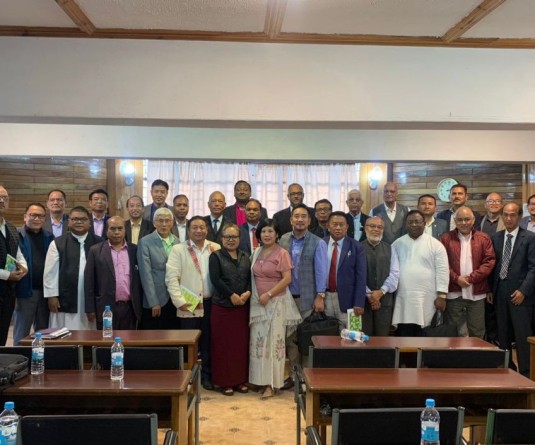
S Seigoulien Haokip
Earlier this month, my brother and I along with my parents visited Tata Institute of Social Sciences- Guwahati (TISS-G), my alma mater where I spent 5 long years of my life as a student. Since it was an instruction day, we decided to start off in the morning so that we could reach early enough to finish touring the campus before the lectures began. The motive was clear; my parents were determined to visit the institutes where their children studied. We spent the past few days in Meghalaya where we also visited St. Edmund’s College, Shillong where my brother completed his college. He showed us the place where he used to live, Bro. J.N. Foley Students’ Residence. He told us that it was formerly known as the New Hostel. All these things, what did they mean to my parents who hardly travelled outside Manipur? Why were they so determined to visit the institutes where their children studied? I guess it is a thing for all parents to get obsessed with their kids, right?
Of all other reasons, I think it was more about passion and hope. The thrill that I saw on my parents’ faces reminded me what education actually meant to them. It was not limited to the affairs of their children obtaining degrees and certificates, but also delivered a sense of achievement for them as well. It showed how important education is, not just for students but for parents too. This calls for revisiting an approach of defining education as solely about individualistic pursuits of well being and dignity. Challenging the limits of such narrow approach, is it possible to map the interconnections between education vis-à-vis individual, family and society at large? In this regard, the manner in which a sense of passion and hope trickles down to my parents posits itself as a testament which compels me to reiterate that “education is the vehicle for social progressiveness of all societies” (See: raiot.in, TISS Protest: Locating it from its Northeastern Campus).
However, when sites of hope such as universities are under attack and possibilities jeopardised, there is a concomitant surging up of anger, anguish and frustration. The contemporary struggle at Jawaharlal Nehru University (JNU), Delhi presents an example where one witnesses such incident. For some of the shared commonalities in both the movements, the current JNU issue but drives me to recall the movement we were actively involved in as students at TISS-G. ‘Boycott Fee Hike’, ‘Stop Privatisation of Education’, ‘injusTISS’, one could see all these inscribed on the placards. It was the 21st of February, 2018, the day when the student community of TISS-Guwahati collectively decided to stage protest against TISS Administration. There was a lockdown of the administrative building, all classroom doors were shut while students took out the protest onto the street sloganeering: “Social Justice- Zindabad (meaning long-live),” “Right to Education- Zindabad,” and so on. In fact, it was a movement mooted by the student community across all the four TISS campuses in India: Mumbai, Guwahati, Hyderabad and Tuljapur against the removal of fee-waiver for GoI-PMS students who belong to socially and economically disadvantaged backgrounds.
It is unfortunate that educational institutes and varsity claiming their legacy on grounds of social inclusiveness and academic excellence are under systemic attacks. Worse, such attacks are directed towards a model facilitating many possibilities where one witnesses the realisation of a dream becoming a reality. The persistent attempts to dismantle such inclusive model defeat the whole idea of distributive justice and principles of equality. As Aishe Ghosh, the JNUSU president rightfully points out while addressing the crowd, this student movement is not only about JNU but for a larger cause fighting against privatisation of education. In fact, the trajectory of public policy and education in India we are heading towards seems to be a gloomy one. When the state withdraws its commitment towards inclusive and accessible education, and rather chooses to commodify public education, it indicates that the journey is inclined towards deprivation and marginalisation. So, what forms of society are we anticipating in the coming generations? At this juncture, I would like to quote what Prof. Abhijit Banerjee, a Nobel Laureate and an alumnus said about his experience of JNU:
“Coming to JNU, I encounter India. There is caste; there is real poverty. These things were not actually real for you if you lived in the world that I lived in. So, JNU taught me all about what India is.”
So, are we directed towards destruction of such possibilities of learning experience, unlearning and growing in lieu of building ourselves as responsible individuals, persons and citizens? The onus is on us, a call to join our hands in solidarity with the student community. As a former TISSian and a current JNUite, these are some of my personal reflections on the movements that I encounter as a student. Lastly, I would like to conclude with an excerpt from the closing track of Coldplay’s upcoming album “Everyday Life”:
What in the world are we going to do?
Look at what everybody’s going through
What kind of world do you want it to be?
Am I the future or the history?
The writer is from Jawaharlal Nehru University, New Delhi




